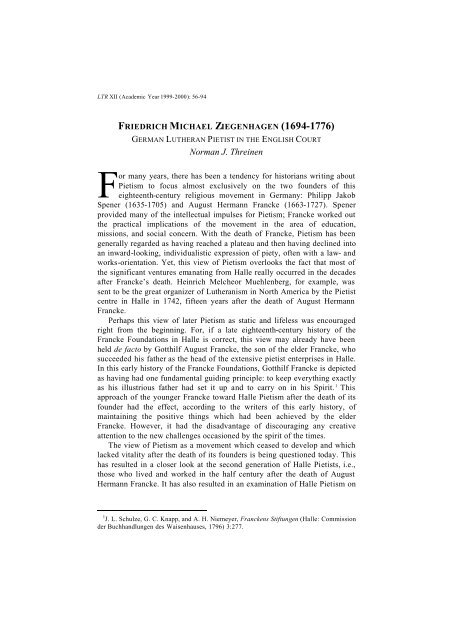LUTHERAN THEOLOGICAL REVIEW - Concordia Lutheran Seminary
LUTHERAN THEOLOGICAL REVIEW - Concordia Lutheran Seminary
LUTHERAN THEOLOGICAL REVIEW - Concordia Lutheran Seminary
You also want an ePaper? Increase the reach of your titles
YUMPU automatically turns print PDFs into web optimized ePapers that Google loves.
LTR XII (Academic Year 1999-2000): 56-94<br />
FRIEDRICH MICHAEL ZIEGENHAGEN (1694-1776)<br />
GERMAN <strong>LUTHERAN</strong> PIETIST IN THE ENGLISH COURT<br />
Norman J. Threinen<br />
or many years, there has been a tendency for historians writing about<br />
Pietism to focus almost exclusively on the two founders of this<br />
eighteenth-century religious movement in Germany: Philipp Jakob<br />
Spener (1635-1705) and August Hermann Francke (1663-1727). Spener<br />
provided many of the intellectual impulses for Pietism; Francke worked out<br />
the practical implications of the movement in the area of education,<br />
missions, and social concern. With the death of Francke, Pietism has been<br />
generally regarded as having reached a plateau and then having declined into<br />
an inward-looking, individualistic expression of piety, often with a law- and<br />
works-orientation. Yet, this view of Pietism overlooks the fact that most of<br />
the significant ventures emanating from Halle really occurred in the decades<br />
after Francke’s death. Heinrich Melcheor Muehlenberg, for example, was<br />
sent to be the great organizer of <strong>Lutheran</strong>ism in North America by the Pietist<br />
centre in Halle in 1742, fifteen years after the death of August Hermann<br />
Francke.<br />
Perhaps this view of later Pietism as static and lifeless was encouraged<br />
right from the beginning. For, if a late eighteenth-century history of the<br />
Francke Foundations in Halle is correct, this view may already have been<br />
held de facto by Gotthilf August Francke, the son of the elder Francke, who<br />
succeeded his father as the head of the extensive pietist enterprises in Halle.<br />
In this early history of the Francke Foundations, Gotthilf Francke is depicted<br />
as having had one fundamental guiding principle: to keep everything exactly<br />
as his illustrious father had set it up and to carry on in his Spirit. 1 F<br />
This<br />
approach of the younger Francke toward Halle Pietism after the death of its<br />
founder had the effect, according to the writers of this early history, of<br />
maintaining the positive things which had been achieved by the elder<br />
Francke. However, it had the disadvantage of discouraging any creative<br />
attention to the new challenges occasioned by the spirit of the times.<br />
The view of Pietism as a movement which ceased to develop and which<br />
lacked vitality after the death of its founders is being questioned today. This<br />
has resulted in a closer look at the second generation of Halle Pietists, i.e.,<br />
those who lived and worked in the half century after the death of August<br />
Hermann Francke. It has also resulted in an examination of Halle Pietism on<br />
1 J. L. Schulze, G. C. Knapp, and A. H. Niemeyer, Franckens Stiftungen (Halle: Commission<br />
der Buchhandlungen des Waisenhauses, 1796) 3:277.













